Recent Fire Damage Posts
Beyond the Flames: The Role of Smoke and Soot in Fire Damage and Restoration
1/30/2024 (Permalink)
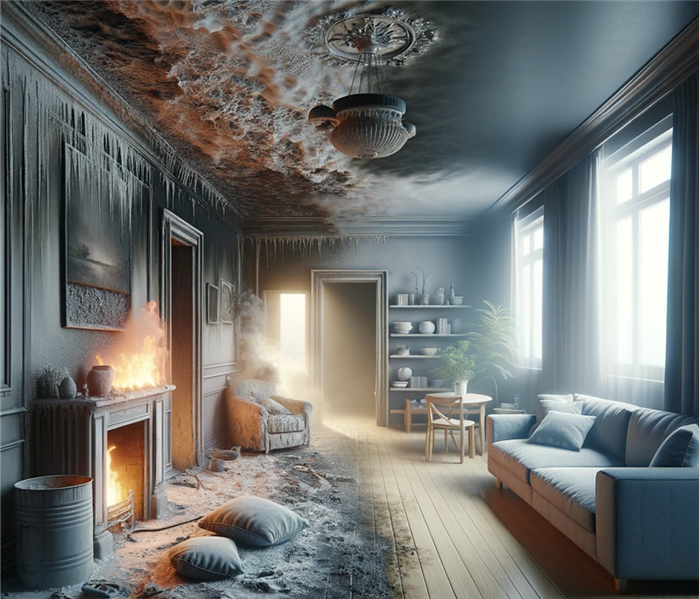 No matter how serious your fire damage may be, SERVPRO of North Atlanta/Buckhead is here to help.
No matter how serious your fire damage may be, SERVPRO of North Atlanta/Buckhead is here to help.
At SERVPRO of North Atlanta/Buckhead, our recent work in Druid Hills, Vinings, and Chastain Park has brought to light the often underestimated impact of smoke and soot after a fire. Beyond the immediate destruction caused by flames, these by-products can continue to harm a property and its occupants. This blog post aims to shed light on the complexities of smoke and soot damage, detailing the health risks, the science behind odor removal, and the specialized cleaning techniques we employ to restore both air quality and property.
The Hidden Hazards of Smoke and Soot
Smoke and soot are pervasive and insidious, settling silently on surfaces and embedding in fabrics. The fine particles of soot, a mixture of acids, chemicals, and dust, can lead to discoloration and a persistent smoky smell. Smoke, with its complex blend of chemical compounds and gases, poses significant health risks, especially to those with respiratory issues, the elderly, and children, causing irritations and potentially more severe health problems.
The Science Behind Odor Removal
Removing the odors associated with smoke and soot is a complex task that goes beyond surface cleaning. At SERVPRO of North Atlanta/Buckhead, we employ advanced techniques like thermal fogging and ozone treatment. Thermal fogging uses a fine mist to penetrate surfaces, neutralizing odors at their source. Ozone treatment, involving ozone generators, breaks down the odor molecules, effectively purifying the air and surfaces.
Specialized Cleaning Processes
In the aftermath of fire incidents in neighborhoods like Druid Hills, Vinings, and Chastain Park, our team is confronted with the challenge of removing smoke and soot residues. This process involves using HEPA vacuums to capture particulate matter, dry sponges for soot, and specialized cleaning solutions for oily residues. Soft furnishings and fabrics often require deep cleaning or special treatments to fully remove odors and residues.
A critical part of the restoration is ensuring the indoor air quality is safe. This includes cleaning HVAC systems to prevent the spread of contaminated air. Our comprehensive approach aims not only to restore the physical structure and contents but also to ensure a healthy living or working environment.
Conclusion
The impact of smoke and soot in the wake of a fire can be as damaging as the fire itself. Understanding and addressing these elements are crucial for effective restoration. At SERVPRO of North Atlanta/Buckhead, we are equipped with the expertise and technology to tackle these challenges, ensuring that your property in Druid Hills, Vinings, or Chastain Park is restored to its pre-fire condition. If you are dealing with the aftermath of a fire, trust in our team to provide a thorough and caring restoration process, helping you move forward "Like it never even happened."
What are the hidden damages of a fire loss?
1/4/2023 (Permalink)
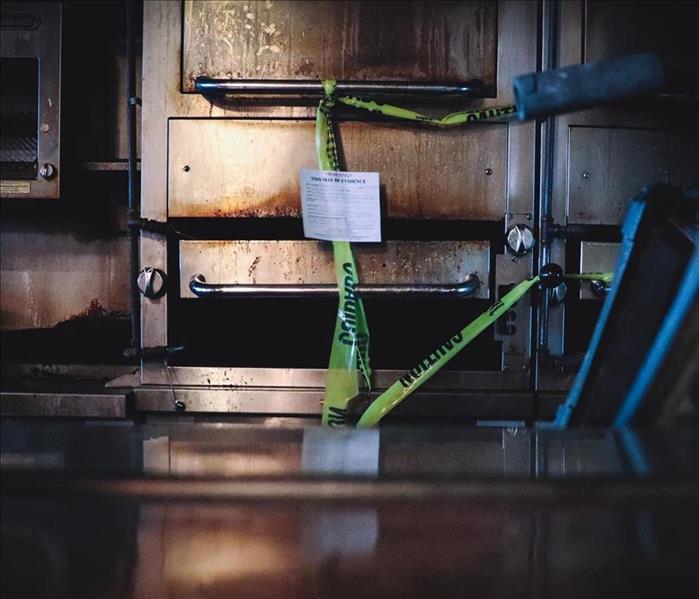 SERVPRO of North Atlanta Buckhead serves all local areas throughout Atlanta, Buckhead, Brookhaven, Sandy Springs and more.
SERVPRO of North Atlanta Buckhead serves all local areas throughout Atlanta, Buckhead, Brookhaven, Sandy Springs and more.
Smoke & Soot Damage
There’s more to fire damage than meets the eye. In addition to the visible destruction caused by flames, fire can also cause hidden damages that can be hard to detect. The two main culprits of these hidden damages are smoke and soot damage, and water damage. Understanding these additional impacts on your property, and how to take care of them, can help ensure that you are reimbursed appropriately for your insurance claim.
One of the primary hidden damages of a fire loss is smoke and soot damage. Smoke and soot can cause a variety of issues, including:
- An unpleasant odor that can linger in the air and on surfaces
- Stained fabric and upholstery
- Discoloration of paint
- Rust, pitting, and corrosion of metal objects such as piping and jewelry
- Damage to flooring
It is important to address smoke and soot damage as soon as possible, as it can have long-term effects on both your health and your property. Inhaling or coming into contact with smoke and soot can cause respiratory issues, including bronchitis and asthma, and can even lead to more serious health problems such as stroke, heart attack, and cancer. Smoke and soot can also linger on surfaces and inside electronics and appliances, making it difficult to remove and contributing to further property and contents damage. To properly address smoke and soot damage, it is best to hire a professional cleaning and fire damage restoration service like SERVPRO of North Atlanta/ Buckhead.
Water Damage After a Fire
Water damage is another common hidden damage that can occur as a result of a fire. While firefighters may use large amounts of water to extinguish the flames, this can also result in significant water damage to your property. Water damage can cause structural issues, damage to electronic devices and appliances, and harm to furniture and important documents. If left unaddressed, water damage can also lead to the growth of mold, which releases spores into the air. To properly address water damage, it is best to hire a professional emergency restoration service. Most homeowners insurance policies will cover the cost of remedying mold when it is the result of a covered cause of loss.
If you have experienced a fire loss, it is important to have someone on your side to help you navigate the insurance claims process. An experienced fire damage restoration team like SERVPRO of North Atlanta/ Buckhead can make sure your home or business is fully restored properly while following your insurance company's processes to ensure nothing is left behind.
What are the next steps to take after experiencing a fire loss?
If you have experienced a fire loss, there are several steps you should take to ensure that you are properly compensated by your insurance company. These include:
- Documenting the damages: Take photos and make a list of all the damages to your property, including any hidden damages.
- Contacting your insurance company: Report the fire loss to your insurance company as soon as possible.
- Seeking professional help: Hire a professional fire damage restoration service to address smoke and soot damage and an emergency restoration service to address water damage.
- Considering hiring a public adjuster: A public adjuster can help you navigate the insurance claims process and ensure that you receive the maximum settlement for your claim.
Dealing with the aftermath of a fire loss can be overwhelming, but understanding the full extent of the damages and taking the necessary steps can ensure a complete fire damage restoration in your home or business.
Thankfully, our SERVPRO of North Atlanta/ Buckhead team is here to help. No matter how severe your fire damage may be, our experienced crew of restoration technicians uses cutting-edge techniques and equipment to restore fire damage "Like it never even happened." So whether your fire damage occurred in Atlanta, Buckhead, Brookhaven, or Sandy Springs, call our team today!
How to Respond to a House Fire: The Most Effective Strategies
3/28/2022 (Permalink)
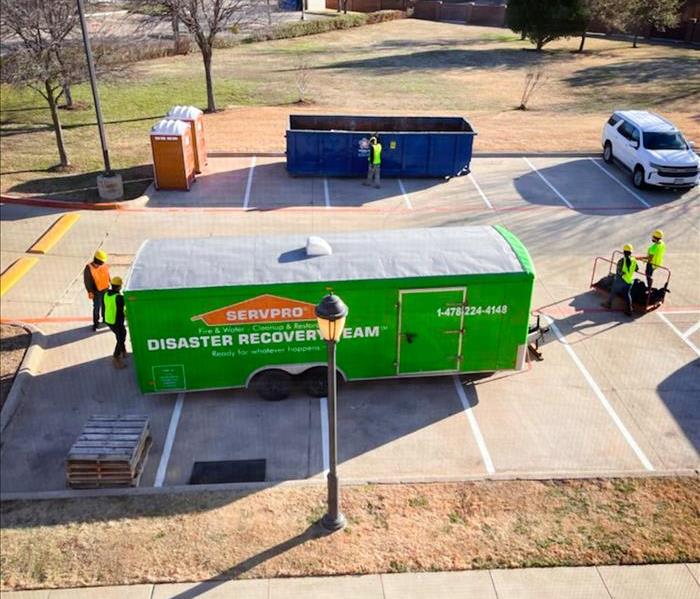 No matter how serious the property damage is, SERVPRO of North Atlanta/Buckhead has the crew and the expertise to restore your home after a fire.
No matter how serious the property damage is, SERVPRO of North Atlanta/Buckhead has the crew and the expertise to restore your home after a fire.
It's that time of year again - fire season. Between the months of February and May, the weather gets hotter and drier, while the risk of house fires goes up. A fire can start from any number of sources: a faulty wire, an overloaded outlet, a kitchen accident, or a bonfire left unattended. If your home catches fire, it's important to know how to respond quickly and effectively. In this blog post, we will discuss the most effective strategies for responding to a house fire. Stay safe!
If a Fire Starts, Here Is What You Need To Know:
The first line of defense against a fire is to know how to safely use the right fire extinguisher for a house fire. This simple step can save lives and tens of thousands in property damages. If the fire loses control, immediately get out and stay out, then call 9-1-1. Leave all your things where they are and save yourself.
If your clothing catches on fire, remember the old phrase: Stop, Drop, and Roll.
If you live in a building with elevators, it is important to use the stairs in case of a fire. A fire can short out the elevator electrical system, and the shaft can act like a chimney and rapidly fill up with dangerous smoke.
Understanding how to use doors to your advantage during a fire can mean the difference between life and death. If the door or handle is warm, do not open it. If you can't escape through the primary way, find another way out. Do not open any doors that are warm to the touch.
If some, heat, or flames block your exits, close any doors around you, place a wet towel under the doors and call the fire department or 9-1-1. Tell them exactly where you are so they know where to find you.
If you're near a window that you can't use as an escape, open it and wave a brightly colored cloth or use your phone flashlight to signal for help.
What To Do After a Fire
After a fire, it is important to contact a professional fire damage restoration company like SERVPRO of North Atlanta. We have the training, experience, and equipment to properly restore your home - "Like it never even happened."
If you try to clean up the fire damage yourself, you could end up making the situation worse both in your home and with your insurance company's process.
Trust the experts, and call today!
Lightning and Risk of Fire to Your Home
2/21/2022 (Permalink)
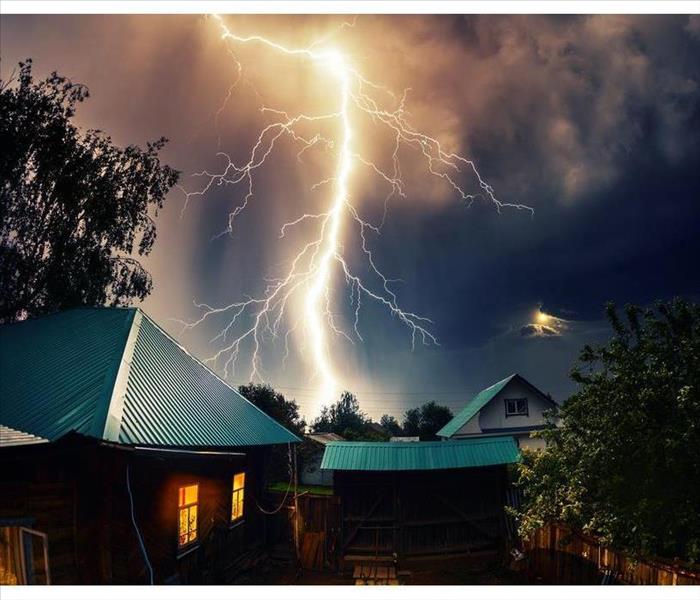 Electrical storms and strikes can develop quickly, wreaking havoc on your life by causing your home to catch fire.
Electrical storms and strikes can develop quickly, wreaking havoc on your life by causing your home to catch fire.
Electrical Storms and Potential Risks To Your Property
Lightning is one of the most dangerous natural forces in the world, and this phenomenon has the ability to cause significant damage to the homes that it strikes. One of the major hazards that it poses is the threat of lighting fire to your residence. If you are a homeowner in Morningside, GA, read on for more information about electrical storms and the potential risks to your property.
How Does It Enter Your Home?
A bolt of lightning will always find the quickest path to enter the ground, and unfortunately, homes can sometimes be part of that path. Your home can be entered a number of ways.
- Direct strikes
- Power, cable or phone lines
- Electrical gates or doors
- Metal pipes
How Do Fires Start?
Once a strike occurs, the risk of a house fire is considerable. A bolt is a current of electricity that can reach temperatures comparable with the surface of the sun. The intense heat is enough to ignite a flame, especially in highly flammable parts of the home, such as the attic or within the walls where insulation is present. Electrical charges can also create dangerous sparks responsible for lighting fire to homes and buildings.
Stay Safe During Storms
Remember, you are within striking distance if you can hear thunder. During storms, stay inside, away from doors and windows, and avoid using items that place you in contact with plumbing or electricity. If your home suffers a strike, contact the fire department to check over your property. If you detect smoke, call 911 and evacuate everyone from the premises immediately.
Electrical storms and strikes can form quickly and wreak havoc in your life by lighting fire to your home. If your dwelling is a victim of this type of blaze, don’t hesitate to reach out to an emergency restoration service to assist you.
3 Steps of the Fire Cleanup Process
1/21/2022 (Permalink)
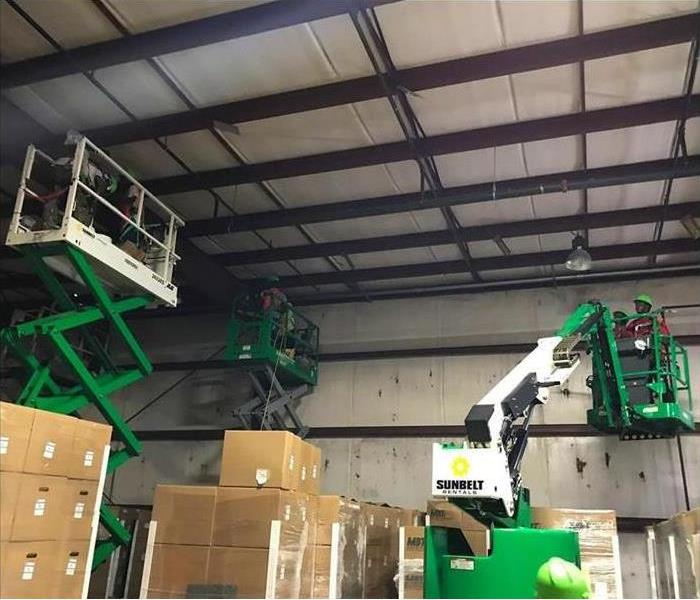 Fire cleanup experts in Paces Perry, GA.
Fire cleanup experts in Paces Perry, GA.
The Fire Cleanup Process
A fire in your commercial property in Paces Ferry, GA, can cause multiple kinds of damage to almost every part of the affected area. It is not uncommon for a building that has burned to have just as much water damage as smoke damage. You also may need to have soot removed, and there is likely to be an unpleasant odor throughout the space. It’s smart, therefore, to hire fire restoration specialists who are trained and certified to handle all the steps of the fire cleanup process.
1. Fire Damage Remediation
The first part of the smoke cleaning process usually starts with the structural damage caused not only by the fire but also by the water used to put it out. Experts may need to employ several techniques to fix your building:
- Extract standing water
- Remove damaged items, including walls, insulation, flooring and ceiling tiles
- Clean and dry the whole area
- Replace parts of the structure that were destroyed
- Match new parts to existing frame to restore the proper aesthetic
Once the smoke damage to the structure has been remedied, technicians can move on to ridding your property of soot.
2. Soot Removal
After a fire, every square inch of the space where it occurred is probably covered in a layer of soot. The tricky thing about these carbon flakes is that they are highly transferable, so experts must be careful to keep the area closed off. Safety gear is necessary during soot damage remediation so that it doesn’t come into contact with skin, hair and lungs.
3. Odor Elimination
Smoke can be pervasive. It can get into tiny cracks and crevices, so the odor tends to linger. An ozone machine that releases molecules that bond with and neutralize smoke particles may be used. Another popular technique is thermal fogging. This process works by heating up a deodorizing chemical and disseminating it in the same basic way the fire spread the smoke. Both methods can help get rid of smoke odor.
Smoke damage often requires professional restoration. Experts can make your building look "Like it never even happened."
How To Deal With Smoke Damages From Adjacent Businesses
12/31/2021 (Permalink)
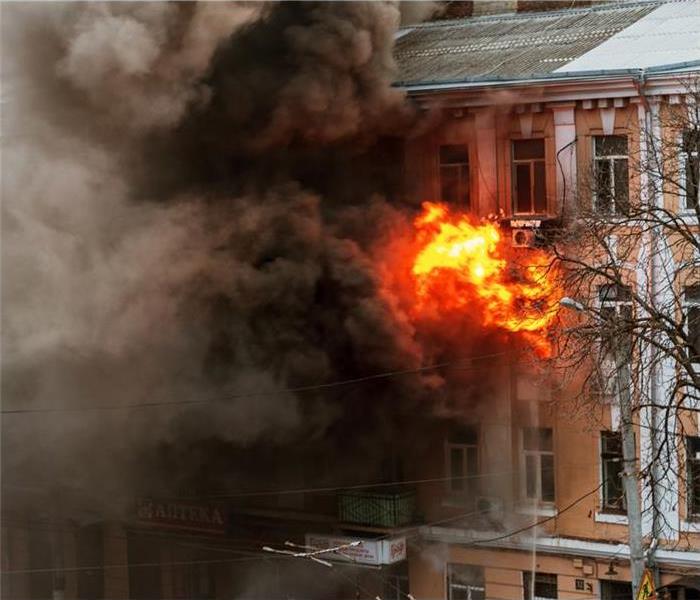 Fire and smoke damage to a building in Virginia Highlands, GA.
Fire and smoke damage to a building in Virginia Highlands, GA.
Even a small fire can cause a lot of smoke damage and those damages aren't just confined to the immediate building. If your commercial property has suffered smoke and/or soot damage because of a fire in the building adjacent to yours, there are steps you can take.How To Respond to Damages From Smoke
Begin by talking with your insurance agent to determine how damages will be covered. Smoke damage is commonly covered by most policies, and you can improve the strength of your claim:
Thoroughly document damages by noting the date of the fire, the types of damages and losses, any injuries, and descriptions of the damages. Add photographic evidence of the damages.
Understand that many of the items in your building may need to be thrown out and replaced even if they don't appear smoky.
Pay professionals to clean and restore your property. After you've thoroughly documented the damages, turn the rest of the work over to professionals. There are often hidden dangers and hazards associated with soot and ash. Smoke damage cleaning and reconstruction technicians have specialized equipment and gear to protect themselves and your belongings.
Consider talking to a public adjuster if the damage is severe. Insurance companies are often determined to pay the lowest about possible, but you may be eligible for a higher amount of reimbursement.
There are many factors that determine the extent of damage to your building when an adjacent property suffers from fire damage. Without the experience and knowledge that comes from dealing with many fire-damaged properties, it is possible to overlook problem areas or cause further harm when trying to handle smoke cleaning on your own.
Your First Response to Smoke and Flames
As soon as you notice a fire in a neighboring building, take steps to keep your employees and customers safe. Next, contact emergency authorities. When it is safe for you to return to your building, contact your insurance company and Virginia Highlands,GA, smoke damage cleanup and restoration professionals.
Tips to Prevent a Christmas Tree Fire
11/18/2021 (Permalink)
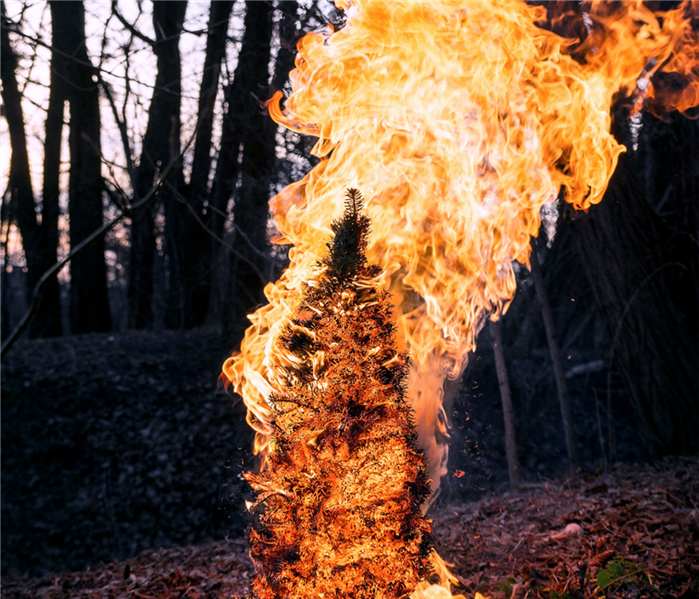 Keep your Christmas Season Fire Damage-Free with these tips!
Keep your Christmas Season Fire Damage-Free with these tips!
Christmas is almost here! If you’re planning on putting a natural Christmas tree in your home in Buckhead, GA, here are some quick tips to be fire smart and protect your home from Christmas tree fire damage. From keeping candles out of sight to using holiday decorations safely, your home will be protected from potential fire damage with these five tips to prevent a Christmas tree fire in your home this year.
The Facts, Christmas Tree Fire Hazard
Did you know?
According to research by the NFPA, "From 2014 to 2018, US fire departments responded to an estimated average of 160 home structure fires per year that began with Christmas
trees. These fires caused an annual average of two civilian deaths, 14 civilian injuries, and $10.3 million in direct property damage." With these tips, you'll make sure to enjoy your Christmas without worrying about needing fire restoration work. However, in case you do need us, SERVPRO of North Atlanta is Here to Help.
Pick the Right Tree to Prevent Fire Damage
A natural Christmas tree can be a beautiful and festive addition to your home, but it also carries an added risk: If not properly maintained, there’s a chance it could ignite. To prevent fire damage from occurring, choose one that is fresh and has been recently cut. Some trees tend to be drier than others; you may want to avoid pine or spruce trees, as these are often drier. Fir Trees tend to stay fresh the longest.
Try to find a fresh tree by doing the "needle drop" test. With the tree upright, lift it then drop it on the ground a few times. If a lot of needles fall off, then the tree might be dry enough to become a fire hazard. Trees with sticky tree trunks also tend to be fresher than others with dry trunks.
Tree Placement to Reduce Fire Risk
After buying your tree, it's important to prepare it to last the whole season. Do this by first cutting the base 2" of the trunk and placing it in a tree stand with water. Try to keep the tree watered daily so it stays fresh for as long as possible.
When finding a perfect place for your tree and presents, make sure that your tree is kept away from any heat sources, including lamps and fireplaces. Also, try placing it near an outlet; you don't want to accidentally cut off power during decorating! Keep it at least 3 feet away from a fireplace, radiator, heat vents, or other heat supply. With too much heat, a live tree can quickly dry up and raise the risk of fire damage.
Lighting Your Tree Safely
Natural Christmas trees, like any tree, are flammable. Even trees that have been coated with fire retardants can burn down your home if you aren't careful while decorating. Use only lights that are listed by a qualified testing laboratory, such as Underwriters Laboratories (UL for short). Avoid putting lit candles on or near your tree. Ideally, avoid using flammable decorations, such as tinsel.
Use flame-retardant or LED lights instead of regular bulbs. If you have any worn or broken cords, it is best to replace damaged strings of lights rather than risk fire damage to your home. If you plan on using an open flame around your tree, make sure it's placed at least 3 feet away and never leave the house or go to sleep with lights connected to power and unattended.
With these tips in mind, your Christmas can be safer and fire damage free. However, if things go wrong and you need help repairing your home or business after a fire loss, SERVPRO of North Atlanta is Here to Help.
Call us at (404) 261-2925 for immediate assistance. Our teams of experience fire restoration technicians are available 24/7/365.
Combatting the Perils of Candles
11/10/2021 (Permalink)
 Finding good candle alternatives can reduce the chances of a fire breaking out.
Finding good candle alternatives can reduce the chances of a fire breaking out.
Candle Alternatives
Unattended candles are a common cause of house fires in Buckhead, GA. Most people do not realize how dangerous this household item can be. You can combat the potential perils by using candle alternatives, practicing fire-safe methods and knowing what to do in an emergency situation.
Alternatives
Rather than using a product you know can be dangerous, it is often better for you to turn to a flameless alternative. Common products that can replace these popular home pieces include the following:
- Essential oil diffusers
- Candle warmers
- Air fresheners
- Reed diffusers
- String lights
Candles usually do two things for your home—provide lighting and a pleasant smell. Some of the alternatives can either add light to a room or improve the aroma. You may want to incorporate multiple alternatives to achieve the same effect as candles.
Fire-Safe Methods
Using candle alternatives isn't the only way you can combat the perils of this small open flame. You should also put fire-safe methods in place whenever you light a wick. This means keeping candles a safe distance away from paper materials and only lighting them on a level, hard surface. You should also always remain in the room while a candle is burning. If you think you might fall asleep, you should blow the flame out first.
Emergency Plans
If a candle fire does break out, you need to act quickly to remediate the situation. You should try to put out the fire if it is safe for you to do so. If the fire ravages a part of your home, you should call in a residential fire cleanup professional to help you get your house back to normal.
Because candles can provide a nice ambiance for a home, many homeowners choose to use them throughout the space. Finding good candle alternatives can reduce the chances of a fire breaking out. However, you need to remember to use fire-safe methods if you ever do use a traditional candle.
4 Safe Candle Alternatives for Your Home
7/23/2021 (Permalink)
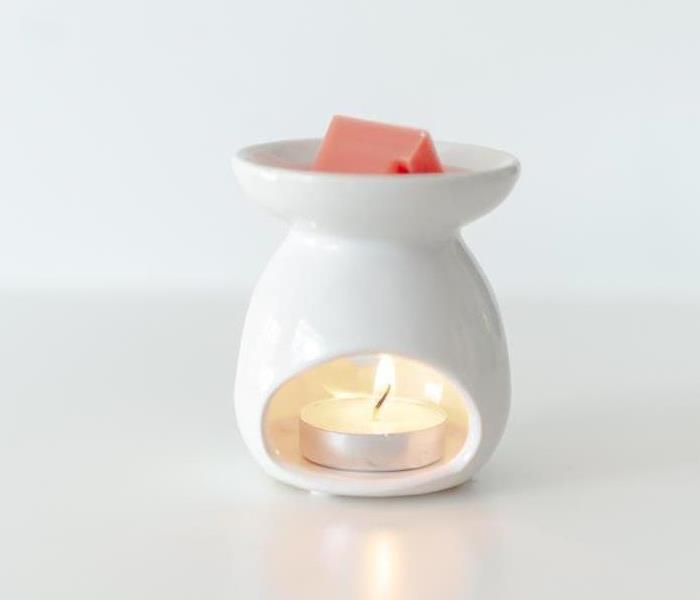 Candle alternatives are helpful for saving your residence from the risk of fire.
Candle alternatives are helpful for saving your residence from the risk of fire.
4 Candle Alternatives That Are Safe To Use In Your Home
When darkness falls, or the air needs freshening, people often turn to candles. Despite the appeal of their various scents and simplicity, candles pose a fire risk to your home in Lenox Square,GA. Instead of accepting the risk, you can consider any of these four candle alternatives.
1. LED String Lights
LED lights are not just for the holiday season. With their use inside your home, you can provide the same light a candle does. This can be done by stringing them across a table or filling a glass with a line of them to create a makeshift lamp. LED lights are a flameless alternative to creatively brighten your house in whatever color you wish.
2. Electric Candles
As a direct replacement for candles, tea lights use batteries instead of fire. They have the appearance of candles if you desire to preserve their aesthetic. The major advantage of electric candles compared to typical candles is the ability to leave them lit even when you can’t monitor them. With this substitution, there is no need to fear a candle fire while asleep or in another room.
3. Reed Diffusers
If the pleasant scent of a candle is what you are looking for in your candle alternatives, reed diffusers are a natural option. Using only reeds and scented oils, the aroma seeps into the air and fills a room. The scented oil comes in many varieties so you can find one to your liking without the worry of any dangerous heat.
4. Wax Warmers
While similar to a candle, wax warmers are flameless and safer. By using electricity or batteries, the dish containing wax heats up and carries the scent around like a candle but without the flame.
Candle alternatives are helpful for saving your residence from the risk of fire. Even if your best efforts of fire prevention fail, fire damage restoration is available for the aftermath of when a candle or other flame goes awry. Using flameless sources of scent and light will make your home less fire prone.
Avoiding Puff Backs in Your Home
6/25/2021 (Permalink)
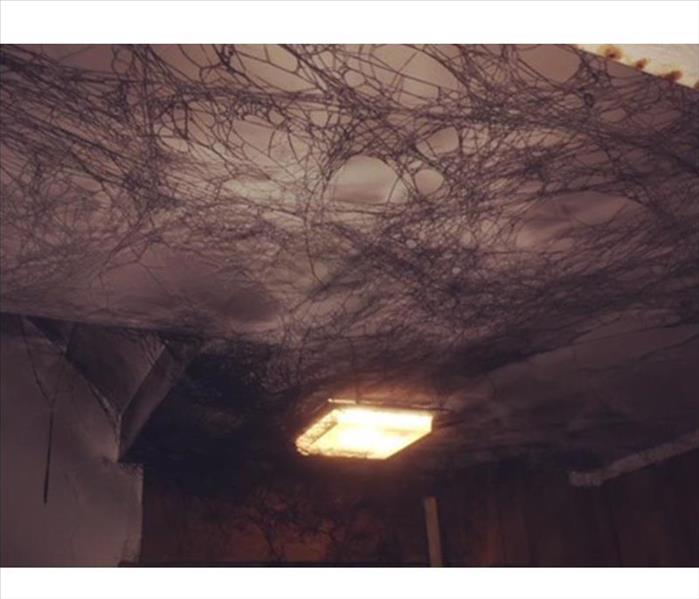 Puffback damage in Sandy Springs, GA
Puffback damage in Sandy Springs, GA
How To Prevent A Puffback In Your Home
Your furnace works hard day in and day out to keep your Sandy Springs, GA, home a warm, comfortable place to live for you and your family. However, when left to its own devices too long without the proper maintenance measures, this same furnace can produce a puff back, a small inner-furnace explosion with the power to spread soot and smoke all across your home in a matter of seconds. The best way to defend against this issue is to
- Schedule regular inspections
- Regularly change your filters
- Check your fan now and again
By taking these steps and learning the basics about puff backs, you can ensure you never face this issue in your home.
Invest in Inspections
The average puff back can be caused by a wide range of reasons, almost every single one of which boils down to improper maintenance over extended periods of time. That’s where having a professional on your side comes in handy. Having an annual inspection done by a certified pro helps you catch issues early on and keeps your furnace running smoothly so furnace explosions are never a concern.
Change Filters
A leading cause of puff backs is a clogged filter. When filters become clogged, dirt and dust get sucked into a furnace. Especially in oil-burning furnaces, these particles can combust, leading to an explosion that sends soot flying through the vents. Filters are generally affordable and easy to replace, fortunately, making this a precautionary step any homeowner in Sandy Springs, GA, can take.
Check Fans
Another cause of puff backs is a fan that’s not operational. When the fan can’t move, heat gets backed up in your vents and furnace, which contributes to the formation of puff backs. Checking both your fans and vents now and again helps ensure the heat is moving as it should be.
Each of these steps is fairly simple but can be crucial. You want to do what you can to prevent a puff back of any magnitude from occurring in your home.
5 Steps for Cleaning and Maintaining Your Gas Range
3/30/2021 (Permalink)
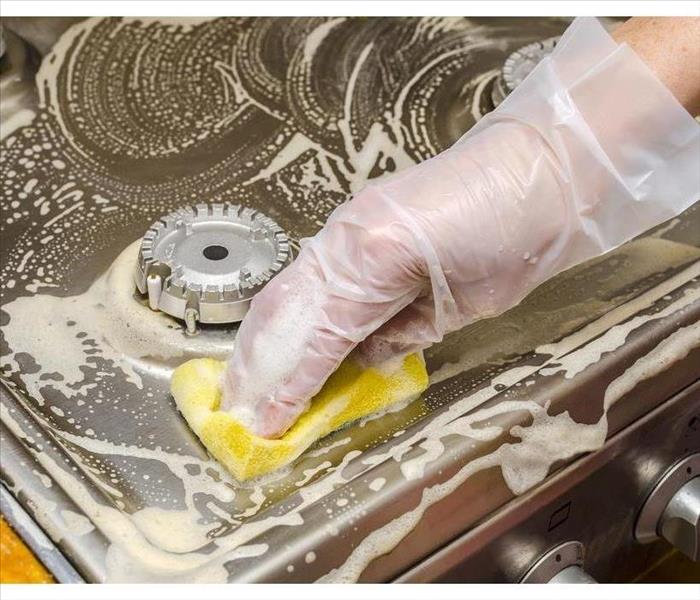 Keep your gas range clean and you will avoid grease fires.
Keep your gas range clean and you will avoid grease fires.
Keeping Your Kitchen Clean Can Prevent Grease Fires
While more and more homes have electric stoves and ovens, a gas range is still a popular choice for many people, especially those who are serious about home cooking in Atlanta, GA. One downside to a gas stove over a flat-top electric stove is that the cleaning process is more involved. However, not only does regular cleaning keep your kitchen looking spic and span, but it can also prevent smoke and grease fires.
1. Remove Grates
On a gas range, you can remove the grates around the burners. Soak them in a sink of warm, soapy water while you work on the rest of the stove. Later, scrub them clean.
2. Clean Crumbs
Loose crumbs on your stove are what cause a smoke smell while you're cooking. Charred bits of pasta, crusted on sauce, and other mysterious tidbits that always end up right under the flames not only smell bad, but can lead to a fire.
3. Spray Cleaner
Choose your favorite cleaning products but keep in mind that some more abrasive chemicals might strip the temperature markings from your stove's dials. A mixture of vinegar and water works well to cut grease from your stovetop. Spray it on, let it sit for a bit, and then wipe clean.
4. Scrub Stains
For stubborn stains usually caused by grease, dish soap and a toothbrush can work wonders. This is the part where regular maintenance makes this chore much easier. By taking care of a couple of grease spots now, you save yourself hours of work later if you let the stains build up.
5. Degrease Burners
Even the burners need some love. The burner tops can soak with the grates while the toothbrush can help get grease out of the burner heads. Where there is grease buildup, there's a fire risk. While a fire restoration company can help you put your kitchen back together after a fire, proper range cleaning will prevent many problems.
A gas range is a great tool for your home cooking endeavors. Proper maintenance will keep your kitchen looking tidy as well as a safe place to turn out gourmet meals.
4 Candle Alternatives for Fire Safety
2/2/2021 (Permalink)
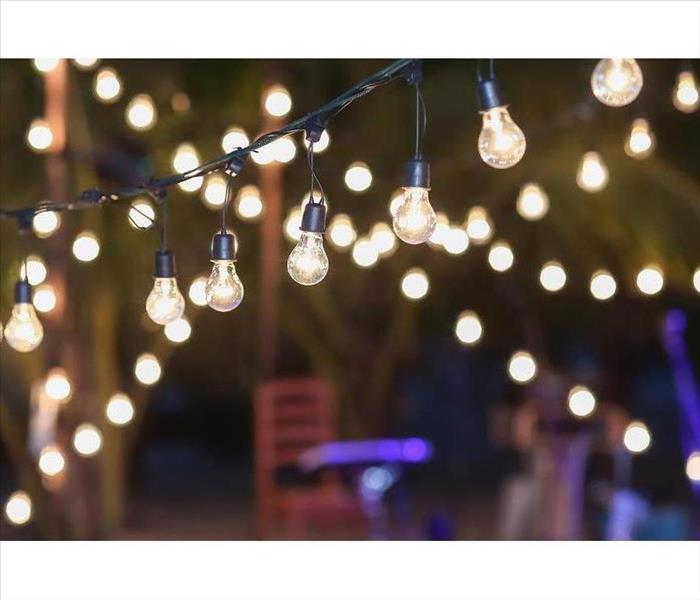 Strings of lights are designed with fire safety in mind
Strings of lights are designed with fire safety in mind
Here are Four Fire-Safe Candle Alternatives
Candles are used to create decorative lighting effects or release fragrances. Whether you are looking for safer mood lighting or a way to diffuse a scent without any risk of a candle fire, here are four fire-safe candle alternatives.
1. Battery-Powered Candles
A flameless electric alternative to candles can be placed anywhere for decorative or lighting purposes. Electric candles come in a wide variety of colors, heights, thicknesses and designs. Some battery-powered models are also designed to release fragrances.
2. Strings of Lights
Another way to get a candle-lit look is to string up Christmas or fairy lights. Strings of lights are designed with fire safety in mind. Choose from strands of single-color or multicolor bulbs. It is also possible to set up lights to blink or flicker if desired. Ultra-efficient LED bulbs make replacements affordable and keep energy costs low.
3. Candle Warmers
A candle warmer may be the best option among these candle alternatives for fans of scented candles. A warmer makes it possible to enjoy these fragrances with a much lower fire risk. A warmer may be a base on which a candle sits or resemble a lamp.
4. Diffusers
Reed diffusers do not resemble candles. For a different look, reeds in oil can be an attractive, creative and flameless way to release a scent. Diffusers have an even lower risk of fire than an electric candle warmer.
Most candle fires occur around the holidays. Battery-powered candle alternatives and strings of lights are safer options for illuminated decorations. Warmers and diffusers are useful for spreading a fragrance throughout a home with a lower risk of fire. If a fire starts due to a candle or any other cause, you should attempt to extinguish the flames or contact the fire department. Fire damage restoration experts can restore or replace damaged building materials at a residence in Atlanta,GA.
How To Prevent a Grease Fire and What To Do When One Happens
12/8/2020 (Permalink)
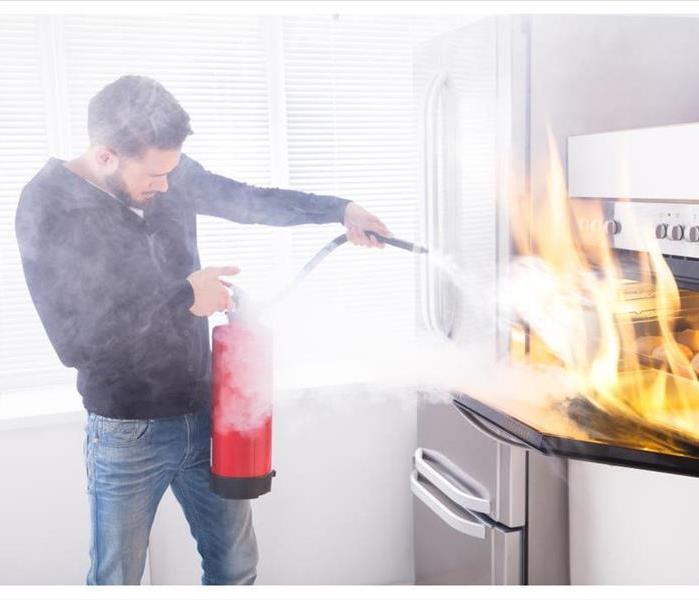 Kitchen fire in Atlanta, GA
Kitchen fire in Atlanta, GA
Home accidents most commonly occur in the kitchen. Among these incidents, a grease fire is particularly destructive. Here are a few ways to stop one from happening in yours, along with how to proceed should a fire break out.
Prevention Tips
Inhibit a greasy inferno from erupting in your cooking space by:
- Always attending an operating stove
- Removing anything flammable from the immediate area
- Only cooking while sober and fully awake
- Having pan lids and an extinguisher nearby
- Restricting children from entering the stove’s proximity
- Heating oil gradually
- Adding food slowly to minimize grease splatter
- Removing moisture from food before submerging it
Ignorance of safety measures could result in an unruly blaze. If an out-of-control grease fire causes damage to your house in Atlanta, GA, hire a company specializing in residential fire restoration to repair the charring and conduct a professional fire cleanup.
Extinguishing Procedures and Related Safety Tips
Place a metal lid or cookie sheet over wayward flames to smother the burning, leaving it untouched until it has cooled. If your fire is manageable, baking soda or salt can be used to snuff it out. Have a Class B dry chemical fire extinguisher within reach for instances where neither of these options is available or adequate.
Never attempt to extinguish an oil-based fire with water. Such attempts make splashes that can easily spread flames. Flour and baking powder are equally dangerous, as they feed fires instead of ending them.
As soon as your burn zone is contained, switch off the heating source. Let full pots and pans remain in place since scorching oils could easily spill. Shepherd everyone outside, remembering to close the door behind you. Bring your phone and dial 911 once everybody has reached safety.
Even minor grease fires have the potential to create severe structural damage. In addition to knowing how to react after such a crisis erupts, become familiar with how to prevent one.
How Commercial Insurance Can Help After a Fire
11/11/2020 (Permalink)
 While commercial insurance can help your business recover financially, you may also need help with the cleanup and repairs
While commercial insurance can help your business recover financially, you may also need help with the cleanup and repairs
How Commercial Insurance Can Help After a Fire
If a fire damages your Peachtree Battle, GA, business, the loss can be devastating. Fortunately, commercial insurance can ease the financial burden.
Coverage
Coverage varies depending on your provider and particular policy. It is important to discuss your policy with your agent so that you know exactly what is covered. In general, though, insurance is likely to cover expenses stemming from the following causes:
- Fire
- Smoke
- Fire-extinguishing efforts: broken windows, water damage, etc.
- Fire-fighting fees
When purchasing or updating your policy, make sure that it covers everything you would want to replace if damaged by fire, including the building itself, machinery and inventory. Remember that there are likely exclusions to your coverage. For example, your policy may not cover liability. This means it would not pay for damage to your neighbor’s building caused by a fire originating on your property.
Claims
After incurring fire damage, you should call your commercial insurance provider for specific instructions on filing a claim. However, there are certain steps that will apply in most situations. Before you experience a loss of any kind, it is important to make an inventory. Make a list of purchase dates and prices of equipment, software, machinery and everything else covered by your policy. Take video or photographic evidence of all the items. Keep the photos and list in cloud storage or in a secure off-site location. After the fire has been extinguished, take photos or video of the damage before beginning repairs. Be sure to get as much detail as possible. If you are doing a video walkthrough of the damage, it may help to narrate and explain what the damaged items are. Accurate records of the covered property before and after damage ensures the insurance company has the information that they need to adequately reimburse you.
While commercial insurance can help your business recover financially, you may also need help with the cleanup and repairs. A certified restoration company can help you get your business back to preloss condition.
How Do You Put Out a Grease Fire?
9/18/2020 (Permalink)
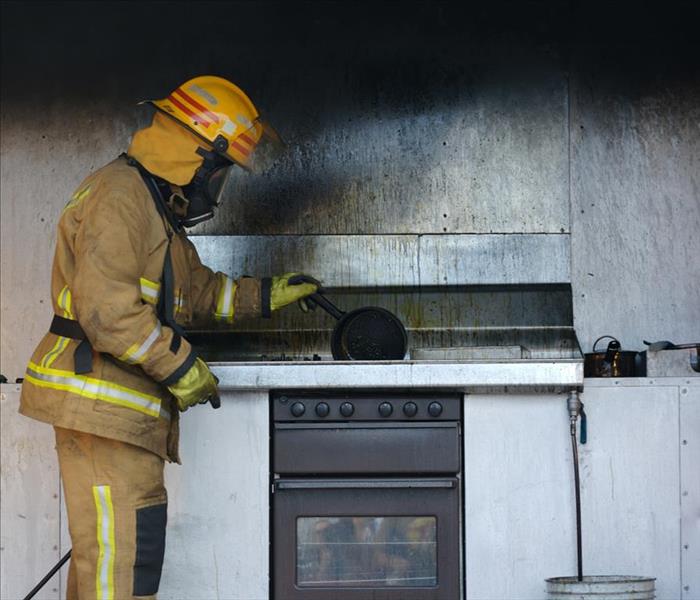 Kitchen fire in Ridgeview Park, GA
Kitchen fire in Ridgeview Park, GA
According to the National Fire Protection Association, cooking fires are the leading cause of home fires and home injuries. A grease fire happens when the oil or fat gets too hot, starts to boil, smokes, and catches fire. The smoking point of vegetable oils is around 450 degrees Fahrenheit; for animal fats, it’s about 375 degrees F.
Prevent cooking accidents by:
- Staying in the kitchen when using the stove
- Removing moisture from food before frying
- Never dropping frozen food in hot oil
- Heating the oil to the recommended temperature
- Having a lid handy in case the oil catches fire
- Keeping kids and pets away from the oven while cooking
Follow These Steps If You Have a Grease Fire
Step 1
If the blaze is contained in a pot or pan, cover the flames with a metal lid or baking sheet. If you still see fire, pour baking powder or salt on the area to smother it. Don’t use flour, baking powder, or biscuit mix as they’re flammable and will aggravate the problem.
Step 2
Turn off the burner if you can do so safely. Don’t try to move the pan; the motion can make the flames stronger. For a fire in a microwave or oven, don’t open the door. Turn the appliance off and call 911.
Step 3
Use a dry chemical fire extinguisher as a last resort. Use the PASS method: pull, aim, squeeze, and sweep. Don’t use water to put out the blaze. When it hits the hot pan, the water will turn to steam, which will spread the oil and the fire.
If you can’t put out the fire, evacuate your home and call 911. Stay at a safe distance and don’t go back in until directed by the firefighters.
A grease fire can do more than ruin your meal. If you find damage in your Ridgeview Park, GA, home, and need whelp with fire cleanup, get in touch with a local fire damage restoration company.




 24/7 Emergency Service
24/7 Emergency Service













